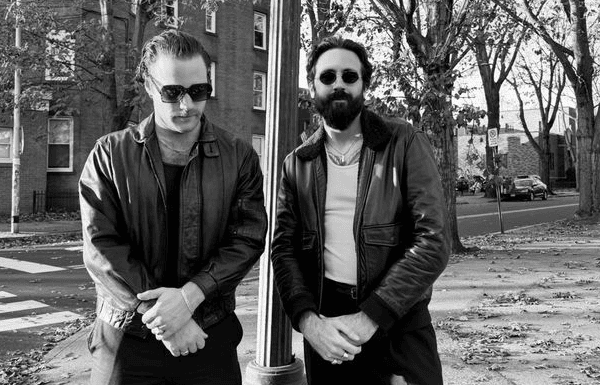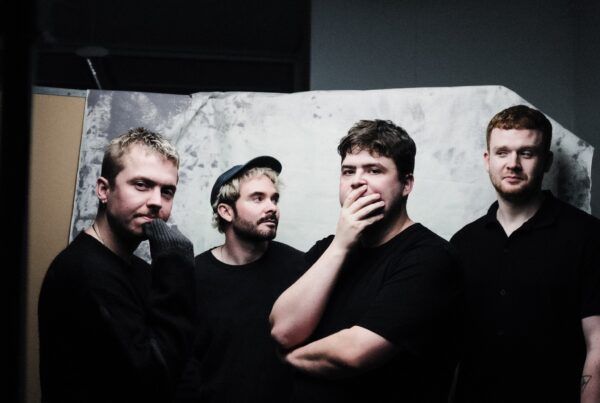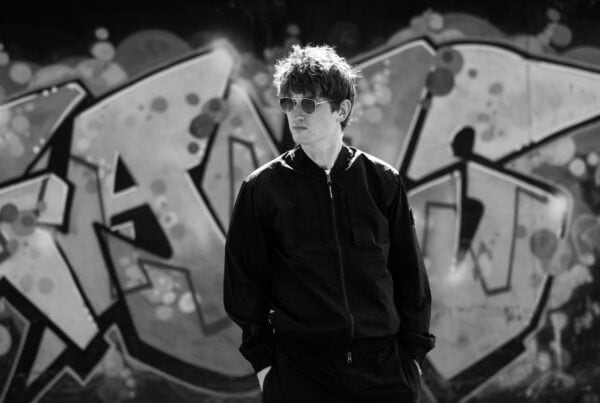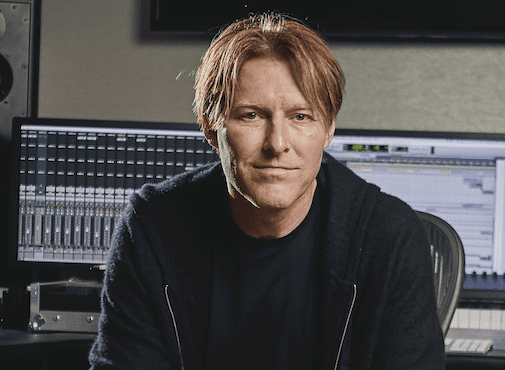Following time in the spotlight in the 1990s as Shed Seven’s guitarist, the creative focus of Paul Banks now encompasses film production with his own company. We catch up with Banks after the completion of another tour by the York-based indie icons and on the cusp of major developments in his day job.
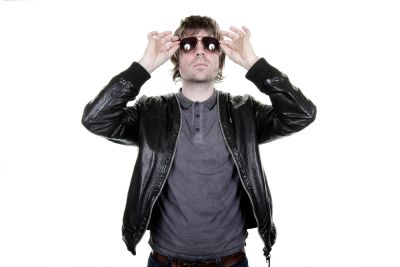
“The new music is the future… we’re some middle-aged blokes going out and doing it.”
S] How’s everything going for you at the moment?
P] “Hectic, absolutely hectic… I can’t believe how quick last year went, it’s been just non-stop. I’ve been right round the world this past year.”
S] How has your attitude to being part of Shed Seven changed in the past few years?
P] “When we got back together, we made no secret of the fact that it’s a reunion; to go off and enjoy what we achieved when we were younger. I say to people, that’s all it is; we’re in a lucky and fortunate position that we’re able to go out and play a back-catalogue of hit singles to thousands of people that want to hear them played.
Shed Seven is just something I do with my friends once in a blue moon to go out and let my hair down and to have the nostalgia trip, so it doesn’t impact on my career with Digifish. It works really well; I’m not writing, I’m just playing songs I wrote when I was younger. It’s literally rehearse with my mates and go off and tour every few years and festivals the year after.”
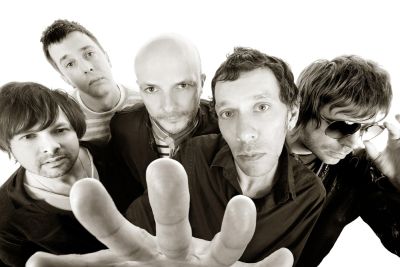
S] What was the dynamic like on your recent tour?
P] “We’re all chilled out, so we all enjoy being together; so there’s no surprise there. Morale’s always as it is, we’re grateful for being given a second bite of the cherry. The fact we sold more tickets on this tour than we did on the last tour is ridiculous. Even the promoter said it’s normal to see a 10 per cent drop in ticket sales, and we had a 10 per cent increase. What we’re finding people are coming to the shows and telling people how good they thought it was, so they are bringing people back with them.
When you’re playing to three thousand people in Birmingham and they’re going mental on a Friday night before Christmas; that makes it worthwhile. Even when you’re playing to sold-out places in Leamington Spa or Norwich – or massive shows in London – Chris Moyles was there in London. That was crazy! I’m very grateful to get the opportunity to do it again.”
S] Do you miss the process of writing new material?
P] “No, to be honest. I did it for ten years and I was burnt out by the end of it. I still write bits of music for my own enjoyment, but I get so engrossed into filming and editing. Recording was a good buzz, I really enjoyed it; but that was us revisiting ‘old friends’, so to speak. I think the minute that we start trying to writing new stuff is where it becomes problematic. People say they want us to write new stuff, but the reality of it – people just want to hear the old stuff.
After writing for ten years, unfortunately we did find that the writing process became laboured and you were overthinking the whole process – ‘Is this going to go on the radio?’, ‘Does this sound like something else we’ve written or our peers have written?’ The minute you put those pressures on yourself, the wheels of the machine come off.”
S] We’ve recently read an interview where Rick [Witter] said there may potentially be a new album in 2013. What’s your take on this?
P] “As much as I’d like it… where would we fit it in? To write an album, and do it properly, you need to be focused 100 per cent on just that. When we were writing back in the 1990s, we never said it was a job, but we treated it as such – we were down to the rehearsal studio every single day without fail and going out at night, having that vibe of a band, so it felt like a family. It’s alright when you’re 22 and you have no responsibilities! There have been a few riffs written on the recent tour that we’ve said we wouldn’t mind exploring, but it’s having the reality of the time to do it.”
S] You describe your songs as “old friends”; do you ever feel tired of hearing them?
P] “I had done in the past – by the time I left the band I was sick of hearing them. The space of time has given us long enough to re-evaluate songs. Before we go on tour and we start rehearsals again, we agree the set-list, so we know which songs are coming; and before I pick up the guitar again, I listen to songs to make them fresh again.
This time, we took a brass section out with us, and it really gave us a kick up the arse. Brass was used a lot during the Britpop era; a lot of our songs certainly had, and they played a key melodic part that had been missed out. It made the songs sound different again.”
S] How important is it for you as a band to support new music?
P] “The new music is the future and we’re some middle-aged blokes going out and doing it. We’re not contemporary anymore! People gave us a leg-up when we were starting out – The Charlatans gave us a massive support gig before we’d even released a record, Suede did the same thing – so we like to do the same. It’s hard enough as it is out there for bands these days, so anything we can do to help.
I do the same with Digifish, my film company. We don’t employ anyone, we have a strong team of freelancers – one of the guys we use regularly works with the BBC, one of the guy is at university. We use lots of young talent; we’re always on the lookout for editors, camera operators – constantly using different people on different projects, and so anyone interested is welcome to get in touch with me.”
S] Are there any parallels between writing a song and preparing an edit for a film?
P] “It’s all about understanding the audience, what you’re setting out to achieve. Whatever you’re doing, they all have light and shade, peaks and troughs in the way they are structure. Even a four-minute song is still telling a story. You’re working with multiple layers; whether it be intertwining guitars with piano or playing the bass off against the vocals; it’s the same with film, mixing shots. Even the software is similar.”
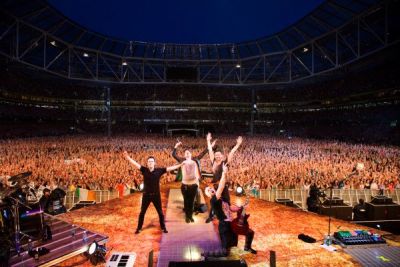
S] As a film-maker, what keeps you driven?
P] “The learning process keeps me motivated. A lot of people think we just do music; the high-profile stuff is, like The Script DVD [‘Homecoming: Live At The Aviva’ – pictured above] came out about two weeks before Christmas; it went to Number 1 in Ireland, and they’re releasing it in America next. Then, there’s The Stone Roses reunion press conference – we were the official camera crew – and we also do these big pop artists, they come to us with big tour announcements.
We also do loads of heritage and culture work, filming at museums; and there’s the corporate stuff and charities – an exciting mix of projects. Each of them brings a new challenge with it, which in turn means that you learn new things. It’s that constant evolving – it’s the same when you play guitar, you’re always learning new riffs. You work with people who inspire you, and that’s what keeps me going.”
S] What advice would you give to young creative people who are trying to build their name?
P] “There is a lot of truth in ‘Don’t give up’, keep pulling away at it, no matter what anybody says to you. It doesn’t matter what route people take, whether it be by the college/university route, or people are more guerrilla in the way they’ve done it, and they’re self-taught. If you believe in what you’re doing, then other people will believe in you; if you don’t believe in what you’re doing, how can you expect people to believe in you?
It’s that line between being confident about what you do, but not being over-confident; it’s a fine line. It’s very tricky for me; I was also into film before Shed Seven got signed. I remember to this day going to careers advice at school saying I wanted to be a BBC cameraman; I said that, because I thought saying popstar would be ridiculous, and he said to me he thought I should possibly become a second-hand car salesman!
I think back to it; not only was it tricky getting recognition for the band, but to have that career and work my arse off for ten years getting a film company up and running. I sometimes wonder where that careers adviser is now? [laughs] The moral of the story is if I’d have listened to his bad advice, I probably wouldn’t have done what I’ve done. I wouldn’t have kept pushing when no-one would listen. Hard work pays off.
I’d be lying to say the contacts I have haven’t helped; they are very influential people in the music industry. The artists I get to work with as Digifish may not be everyone’s cup of tea, but you can’t deny they are humongous artists on a world stage. Having the contacts has given me the opportunity to expand into film, but that’s where it ends. These people will only give you the one opportunity; they’re not going to give you the work just because they know who you are, so the strength of the repeat business is off the quality of the work.”
S] How important is having a work/life balance?
P] “You need that in your life, otherwise what’s the point? It’s all about that – you just make time for it. Even when you’ve got a client breathing down your neck, you need time for your family. If you don’t, how do you recharge your batteries? You will do better work refreshed; when you want to work. I always make sure I have breaks.”
S] Do you think where you’re physically based matters if you want to make a career in a media or music industry?
P] “I don’t think it matters where you’re from, but you’ve got to be prepared to put the graft in; you’ve got to take it to them. If Muhammad won’t come to the mountain… That’s what we did based in York as Shed Seven, we basically invaded London, we took the ball to them. We all had full-time jobs; none of us were born with a silver spoon in our mouths. We were driving down to do gigs and arriving back through the night, sometimes you’d get literally dropped out at work, or having to sit in a bus shelter for an hour and a half, and we built up a reputation.
It’s the same with the film work, we’re getting more work from the South than ever before. It can work in your favour; London people, no matter what business they work in, charge London prices. We’ve had companies who’ve told us they’ve had a better job done for them that’s worked out more cost-effective to get us down from York and put us up in a hotel than to use the London crews.”
S] Finally, what are your plans for 2012, both in terms of Shed Seven and Digifish?
P] “Shed Seven is really looking after itself; we’ll be doing some of the big festivals, which I’m not at liberty to tell you about until they’re announced! It also looks like we’ll be doing some shows out in Indonesia. It won’t be a busy year, as we’re more than likely doing another tour in 2013, so it may cool off this year.
With Digifish, we’re striving to have a bigger and better year than last year. We’re doing more heritage work; we’re going to be working with more top artists, we’re making inroads into different labels down in London, going down the broadcast route, and we’re also moving into a new office hub. So it’s just our aim to keep on keepin’ on!”
You can visit Shed Seven’s website here. At present, Digifish are developing a new website due for a launch in the next few weeks; the current placeholder page is here.

